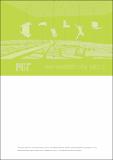Putting matter in place: tradeoffs between recycling and distance in planning for waste disposal
Author(s)
Offenhuber, Dietmar; Lee, David; Wolf, Malima I.; Phithakkitnukoon, Santi; Biderman, Assaf; Ratti, Carlo; ... Show more Show less
DownloadRatti_Putting matter.pdf (2.033Mb)
OPEN_ACCESS_POLICY
Open Access Policy
Creative Commons Attribution-Noncommercial-Share Alike
Alternative title
Putting Matter in Place: Measuring Tradeoffs in Waste Disposal and Recycling
Terms of use
Metadata
Show full item recordAbstract
Problem, research strategy, and findings: Reliable information on trash disposal is crucial but becomes difficult as waste removal chains grow increasingly complex. Lack of firm data on the spatial behavior of waste hampers effective recycling strategy design. In particular, the environmental impact of electronic and household hazardous waste is poorly understood. Our study investigates waste processing in an environmental, economic, and geographic context, using novel methods to track municipal solid waste in the city of Seattle (WA). We observed the movement of 2,000 discarded items using attached active GPS sensors, recording an unprecedented spatial dataset of waste trajectories. We both qualitatively identified facilities visited along each item's trajectory, then statistical modeled characteristic transportation distance and the likelihood of ending up at a specific type of facility by product categories, place of disposal, and collection mechanism. We show that a) electronic and household hazardous waste items travel significantly longer and have more arbitrary trajectories than other types of waste and b) that existing models for waste emissions may underestimate the environmental impact of transportation by not accounting for very long trajectories.
Takeaway for practice: Transportation costs and emissions may diminish the value of recycling. Collection strategies deserve closer attention given the long distances over which they operate. Electronic tracking could provide data for evaluating waste management systems.
Date issued
2012-05Department
Massachusetts Institute of Technology. Department of Urban Studies and Planning; Massachusetts Institute of Technology. SENSEable City LaboratoryJournal
Journal of the American Planning Association
Publisher
Taylor & Francis
Citation
Offenhuber, Dietmar, David Lee, Malima I. Wolf, Santi Phithakkitnukoon, Assaf Biderman, and Carlo Ratti. “Putting Matter in Place.” Journal of the American Planning Association 78, no. 2 (April 2012): 173–196.
Version: Author's final manuscript
ISSN
0194-4363
1939-0130